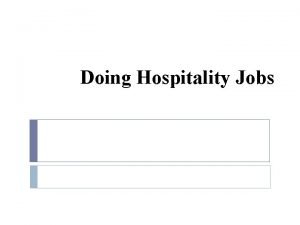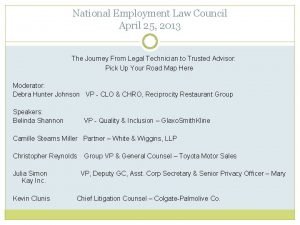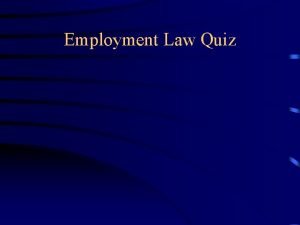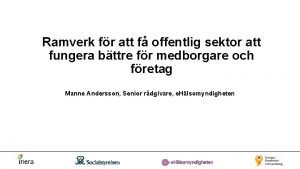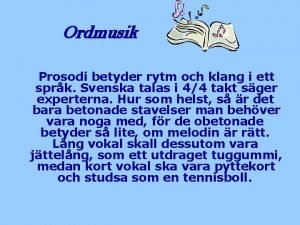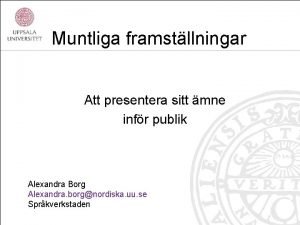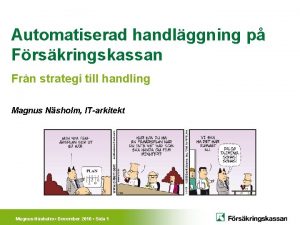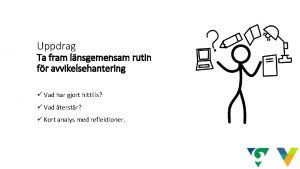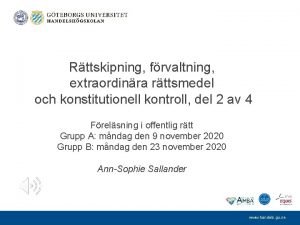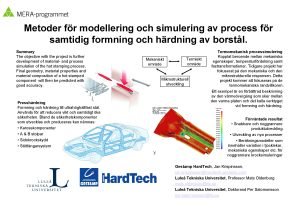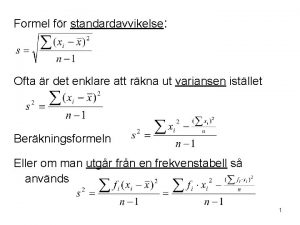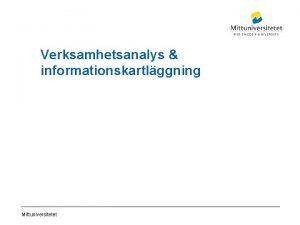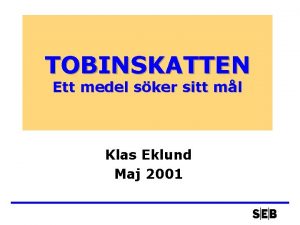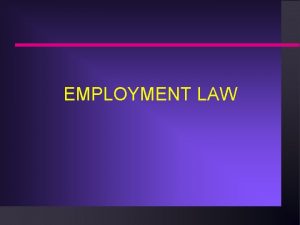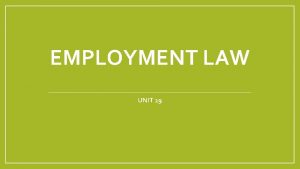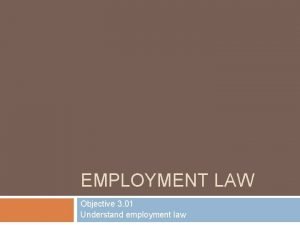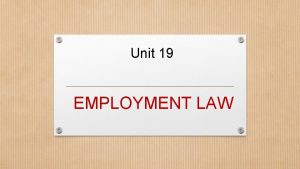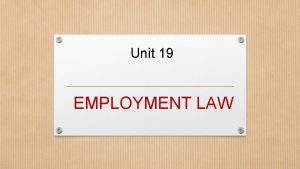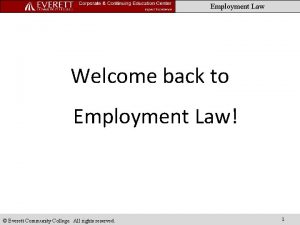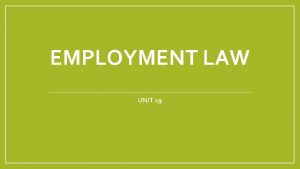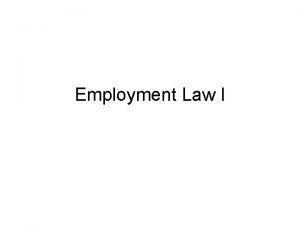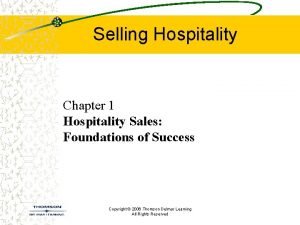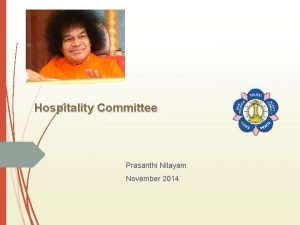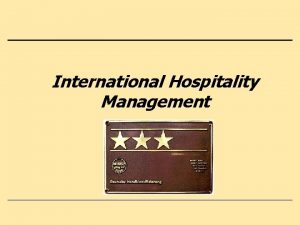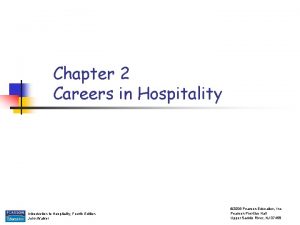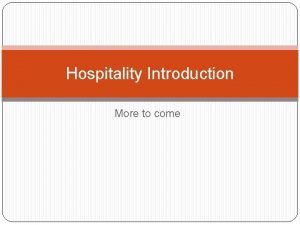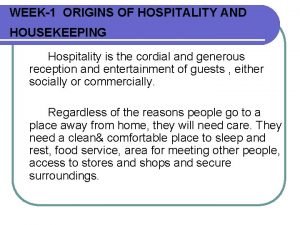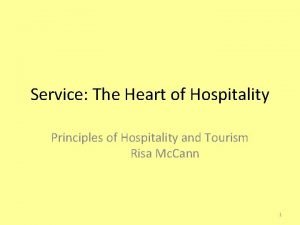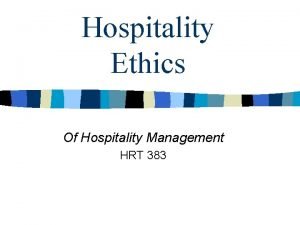Employment Law for the Hospitality Sector novolegal Employment





















































- Slides: 53

Employment Law for the Hospitality Sector

novolegal Employment and Industrial Relations Course: Part I Presented by: Dr Beverly Tonna novolegal Email: btonna@novo. legal Dr Lara Chetcuti novolegal Email: lchetcuti@novo. legal

About novolegal is a law firm in Malta advising local & international clients across a wide range of industries. The firm is committed to helping clients achieve their goals by providing legal advice of the highest quality in an efficient, effective and timely manner. Equipped with a team of diverse and highly skilled lawyers, the firm is committed to providing Malta-related tailor-made solutions. Our practice areas among others include: Employment Law and Industrial Relations Private Client Services Corporate and Commercial Law Capital Markets Financial Services Public Procurement Contract drafting and negotiation

Dr Beverly Tonna Beverly began her legal career when she joined a local law firm specialising in commercial matters as a legal trainee. She then moved to Malta’s fifth-leading audit and advisory firm wherein she formed part of the in-house legal department. Since 2017, Beverly has also assumed the role of a legal advisor to a local blockchain and virtual financial assets consulting company and serves as Designated Person for the entity which is licensed as a Virtual Financial Asset Agent by the Malta Financial Services Authority. As part of this role, Beverly often advises clients on blockchain-based and cryptocurrency-related projects such as token generation events, security token offerings, crypto-funds and cryptocurrency exchanges. As part of her central role within the lawfirm she currently forms part of the financial services team. Beverly advises clients on corporate law, financial services and capital markets legislation. Mainly, Beverly advises clients on regulatory matters, provides assistance throughout all relevant licensing and regulatory approval processes and provides advice on all legal and regulatory compliance related matters. Beverly’s main areas of practice advising clients on corporate, financial services, fintech and capital markets related matters. Other areas of practice include employment and contract law. Qualifications Oxford Blockchain Strategy Programme, Saiid Business School (2019) Award in Introduction to the Virtual Financial Assets Act, Institute of Financial Services Practitioners (2018) Professional Certificate in Taxation, Malta Institute of Taxation (2018) Masters in Advocacy, University of Malta (2017) Bachelor of Laws, University of Malta (2016).

Dr Lara Chetcuti After graduating with a Bachelor of Laws and awarded the Diploma of Notary Public, Lara obtained a Doctor of Laws in December 2015 following the submission of a thesis entitled, “The Prenuptial Agreement- A local and Comparative Study”. Lara was admitted to the Maltese Bar in 2016 and awarded a Professional Award in Taxation from the Malta Institute of Taxation in 2018. After finishing her studies, Lara joined the Civil and Litigation Department in a law firm in Malta in 2015. Her field of practice ranged from family law, property law, succession law, employment law and public procurement. Her role involved the drawing up of various legal instruments, court acts and legal opinions, negotiations and settlement as well as court litigation. Lara has also advised and assisted a number of public bodies in Malta where she was involved in the drawing up of various request for proposals, concession agreements and tender documents. Lara also developed an expertise in Immigration Law where she assisted numerous clients with the identification of optimal residence and or citizenship solutions. Lara has also advised numerous high net worth individuals with matters in relation to personal tax and wealth management. Qualifications Member of the Chamber of Advocates Malta; Awarded a Certificate in Taxation by the Malta Institute of Taxation in 2018 Admitted to the Maltese bar in 2016; Conferred a Doctor of Laws from the University of Malta in 2015; Completed the Diploma of Notary Public from the University of Malta in 2013; and Completed the Bachelor of Laws with European studies from the University of Malta in 2012.

Course Outline – Part 1 Rights and Obligations of Employers and Employees with particular emphasis on Conditions of Employment National Standard Orders vs Sectoral Standard Orders Wages Duration Hours of Work Telework Banking of Hours Scheme Annual Vacation Leave Shut Down Forced Leave Sick Leave Other Special Leave Quarantine Leave Health and Safety Processing of Health Data Itemised Payslips

Course Outline – Part 1 Hotels and Clubs Wages Council Wage Regulation Order S. L. 452. 66 Hotels, Guest Houses, Holiday Complexes, Tourist Villages and licensed holiday flats Clubs Coffee shops, Bars and Restaurants

Course Outline – Part 2 3. Other conditions of employment Terms of engagement (definite or indefinite contracts) Termination of employment Fixed term contracts – Resignation/Termination Indefinite contracts – Resignation/Termination Mutual termination Good and sufficient cause Probation Redundancy

Course Outline – Part 2 4. Covid-19 Measures Wage Supplement Social Measures Tax Deferral Scheme Liquidity Measures Quarantine Leave Reduction of Business Costs and Business Support Changes implemented to the Expatriates Unit’s and Central Visa Unit’s Services and Procedures

National Standard Orders vs Sectoral Regulation Orders. A National Standard Order is a form of recommendation or subsidiary legislation which when approved by the minister is to apply to all employees. A Sectoral Regulation Order is a type of subsidiary legislations, which would apply to a particular sector of employment. If conditions in the collective agreement or in the contract of employment are more favourable than those provided for in the Sectoral Regulation Orders or National Standard Orders then, those which are better shall prevail. On the other hand, if the conditions in the order are more favourable than those in the contract, the former shall prevail.

Conditions of Employment Article 2 of Chapter 452 of the Laws of Malta: "conditions of employment" means wages, the period of employment, the hours of work and leave and includes any conditions related to the employment of any employee under a contract of service including any benefits arising therefrom, terms of engagement, terms of work participation, manner of termination of any employment agreement and the mode of settling any differences which may arise between the parties to the agreement; but it does not include professional ethics arising from any professional relationship between an employer and an employee;

Conditions of Employment Wages Duration Period of employment Hours of work Leave Other conditions such as: (i) terms of engagement (ii) Health and Safety conditions (iii) Manner of termination

Wages In this respect the law stipulates for the following: Minimum wage for 2020: the national minimum wage per week of full-time adult employees is € 179. 33. Other Sectoral Minimum Wages are determined from the economic activity of the enterprise as stipulated in the applicable WRO. Of particular importance to the Tourism Industry is S. L. 452. 66 in relation to Hotels and Clubs. Bonuses: Full statutory bonus payable every six months (June and December) of € 135. 10 Weekly allowance payable every six months (end of March and September) of € 121. 16 Cost of living adjustment: The cost of living increase is obligatory. A full-time employee is entitled to the full increase, while a part-time employee is entitled to part of the cost of living increase in proportion to the hours worked.

Wages Overtime: Employees whose overtime rate is not covered by a Wages Council Wage Regulation Order shall be paid one and a half times the normal rate for work carried out in excess of a 40 hour week. Rates of Pay: Where the same duties are performed, employees are entitled to the same rate of pay. Wage Deductions: An employer is not allowed to make deductions from the employee’s wage except where permitted by law or by an order of a competent court. If an employee fails to work the total number of hours in a week as agreed in the contract of service, the employer may deduct from the total wage due to the employee only that part which corresponds to the hours lost.

Itemised Payslip Conferment of payslip: As from 1 st January 2019, the employer is bound to give to his employees an itemised payslip either before or on the date when wages are due. Employers are bound to give to their employees an itemised payslip, which includes: 1. the name of the employer and the employee; 2. the address of the employer & employee’s designation; 3. the period in respect of which the contents relate to; 4. the number of normal hours worked; 5. the number of hours entitled at overtime or special rate; 6. the number of hours of annual leave availed of and any remaining balance; 7. the total wages paid and the breakdown thereof, including: (i) the basic wages received; (ii) a breakdown of any bonuses, allowances or commissions received; and (iii) any deductions effected, including national insurance contributions, tax and others Employers who fail to provide the payslip in terms of the Regulation will be presumed guilty, and on conviction, shall be liable to a fine ranging between € 500 - € 1, 165.

Duration A contract of employment can be either for a: • fixed term, or; • indefinite term.

Hours of Work Usually, the normal hours of work (excluding overtime) are based on 40 hours a week. In certain cases as may be established by law, normal hours of work can be more, but not exceeding a maximum of an average of 48 hours a week spread over a reference period of 17 weeks. The normal hours of work for full-time employment and the maximum hours for part-time work vary according to the relevant sector or industry. Overtime: The employer can oblige a full time employee to work overtime: when the total hours of work when an employee has do not exceed an average of 48 hours a week, and consented in writing to work over such an average. An employee who chooses not to give his/her consent to work over an average of 48 hours a week cannot be asked to work beyond such an average. Furthermore, if the employee gives consent to work beyond 48 hours, such can be withdrawn by giving at least 7 days notice. Pro rata entitlements apply for part-timers. The pro-rata is calculated as the proportion that the number of weekly hours worked by the part-time employee bears to the number of the normal weekly hours worked by a full-time employee performing same work.

Hours of Work Rest Where the working day is longer than six hours, an employee is entitled to not less than fifteen minutes of rest, unless a longer period of rest is provided by any other regulation or agreement. The employer is not obliged to pay the rest break since it is not considered as working time. Every worker is entitled to a minimum daily rest period of 11 consecutive hours. Every worker is entitled to an uninterrupted weekly rest period of 24 hours in addition to the 11 hours daily rest within a seven day period, or 48 consecutive hours in a period of fourteen days in addition to the 11 hours daily rest. No rest period can be substituted by monetary compensation.

Banking of Hours Scheme The employer may introduce schemes whereby employees would be able to bank up to 376 hours of their normal annual working hours in each calendar year. Through this scheme, employees would be able to work less hours during low seasons which must then be worked over and above the normal weekly working hours during periods of higher work activity. Notwithstanding this scheme, the average weekly working time, including overtime, can never exceed an average of 48 hours over the applicable hours of work, unless the employee concerned has given his consent in writing to work more than a weekly average of 48 hours. Before introducing this scheme, employers must seek authorisation from the Department of Industrial and Employment Relations (DIER). In its authorisation, DIER may impose any conditions deemed necessary.

Telework Any agreement for the performance of telework has to be in writing and shall include the following information: the location of telework; equipment to be used for teleworking and ownership thereof; the amount of working time; the description of the work; reporting lines and monitoring; notice of termination; and reference to the right of reversibility of teleworking. The Conditions of employment shall not be less favourable than those laid down in S. L. 452. 104 Telework National Standard Order. Right of Refusal: Both the employee and the employer may accept or refuse the option to commence a teleworking arrangement. An employee’s refusal to telework shall not constitute a good and sufficient cause for terminating employment, nor shall it lead to a change in the conditions of employment of the employee concerned. Similarly, an employer may whether easily accept or refuse such request.

Telework Rights and Obligations: Teleworkers are entitled to the same rights as other employees. The employer must provide, install and maintain the necessary equipment, as well as cover the costs for communication required to carry out the teleworking. The employee is duty bound to exercise care with such equipment. The employee must bear the cost of any loss or damage caused through negligence. Monitoring The employer may only monitor the employee as set out in the teleworking agreement and must respect the employee’s privacy at all times. Monitoring may only take place if necessary and if carried out in a proportionate and transparent manner. Monitoring technologies such as the installation of software to record keystrokes and mouse movements would likely be considered as disproportionate and invasive. Other measures which could be implemented which respect employees’ privacy include tracking time spent and requiring employees to report to their superiors on work progress. The employer must ensure that data security policies are in place and restrictions on the use of the employer’s IT equipment are communicated to the employees.

Annual Vacation Leave S. L. 452. 87 - Organisation of Working Time Regulations S. L. 452. 115 - Annual Leave National Standard Order Employees are entitled to 208 hours of annual leave in the year 2020 (or pro-rated according to the period of their employment). In the case of workers on a regular daily schedule when a national holiday or public holiday falls on a worker’s day of rest , the worker shall be credited with extra hours of annual leave equivelant to the number of hours of a normal working day. Vacation leave and cancellation thereof is to be agreed upon between the employer and employee. If pre-arranged vacation leave coincides with maternity, sickness or injury, such leave shall be considered as not having been availed of. Any balance of annual leave accrued during a period of maternity, sickness or injury but which had not been availed of, must be carried forward. The law specifies that a minimum period equivalent to four weeks (160 hours) cannot be replaced by any allowance, except where the worker’s employment is terminated. Therefore in respect of the 160 hours that cannot be compensated for, the employee cannot claim payment. It is only possible to carry forward up to 50% of the annual leave entitlement to the following year if there is an agreement with the employer.

Shut Down Unless otherwise agreed in a collective agreement or an agreement between the employer and employee, the employer may only utilize up to the equivalent in hours of 12 working days from the annual leave entitlement, for the purposes of any type of shutdown, bridge holidays or temporary closure of the premises by the employer. Such periods shall be communicated to employees by end of January of each calendar year.

Forced Leave The law regulates forced leave. Should an employee be made to avail himself of forced leave by his employer, the employer shall always provide a written statement justifying the forced leave, within a reasonable time frame before the forced leave starts to run. The utilisation of such forced leave does not amount to a repayable debt by the employee in favour of the employer should the forced leave taken exceed the annual leave entitlement (unless such leave was requested by the employee). This means that: employers may not automatically shift their employees on ‘unpaid leave’ employers will have to pay for those days which exceed the annual leave entitlement without any obligation on the employee to repay the employer for those days which would have exceeded the entitlement.

Sick Leave S. L. 452. 101 - Minimum Special Leave Entitlement Regulations Generally sick leave is the equivalent in hours of two working weeks of full pay less an amount equal to the sum set for sickness benefit entitlement, but this is not always the case as in specific industries certain wage regulation orders apply. An employee who was absent from work on sick leave shall, on the day of return to work, or if longer than 7 days, within 7 days of the beginning of sick leave, present a medical certificate issued by a registered medical practitioner attesting to the employee’s incapacity for work during any such period of absence. Sick leave for part time employees and for employees in employment for less than 12 months is calculated pro-rata.

Other Special Leave S. L. 452. 101 - Minimum Special Leave Entitlement Regulations bereavement leave: 1 working day; marriage leave: 2 working days; birth leave: 1 working day; Parental leave: unpaid parental leave of 4 months that can be availed of until the child has attached the age of 8 years injury leave: up to 1 year on full pay less the injury benefit entitled te the employee in terms of the Social Security Act if s/he is injured during the actual discharge of his duty and not due to contributory negligence on her/his part or to any contravention of safety rules laid down by the employer; urgent family leave- up to 15 hours with pay per year for urgent family reasons. These hours are to be deducted from the annual leave entitlement and must be related to sickness or accident to members of the immediate family of the employment. Maternity Leave- up to 18 weeks but the weeks beyond the 14 weeks are not paid by the employment jury service leave: for as long as necessary; quarantine leave: for any period of quarantine as may be determined by the Superintendent of Public Health or by a any other public authority.

Quarantine Leave The Minimum Special Leave Entitlement Regulations S. L. 452. 101 define quarantine leave as “leave to be granted to the employee without loss of wages in such cases where the employee is legally obliged to abide by a quarantine order confining the employee to a certain area or to a certain premises as determined by the Superintendent of Public Health under the Public Health Act or by any public authority under any other law”. The period of quarantine leave may vary from employee to another depending on his/her circumstances BUT this does not affect the grant Employers are entitled to request documentation from their employees confirming that they were actually obliged to abide by a quarantine order

Quarantine Leave Grant: Employers who have or had a member of their staff (including themselves) on mandatory quarantine leave in accordance with the directives of the Superintendent of Public Health are entitled to a one-off lump sum grant of € 350. The grant is also applicable for members of staff who had to quarantine themselves in view of possible contact with individuals who were directly at risk of infection, such as living in the same dwelling or in the same workplace. This measure only covers grants for full-time employees. Applications need to be submitted within 30 days from the start of the quarantine of the individual.

Health and Safety Article 9 of Chapter 452 (EIRA): Insofar as conditions of employment are concerned, the provisions of the Occupational Health and Safety Authority Act and any regulations issued thereunder shall be deemed to form part of the recognised conditions of employment of employees to whom such provisions or regulations may apply. According to Article 6 of The Occupational Health and Safety Authority Act (Chapter 424) it shall be the duty of an employer to ensure the health and safety at all time of all person who may be affected by the work being carried out for such employer. There are certain measures that need to be taken by an employer to prevent physical and psychological occupational ill-health, injury or death. These include: Avoidance of risk; Identification of hazards; Evaluation of risks; Control at source of risks; Reduction of risk. It shall be the duty of the employer to provide information, instruction, training and supervision as required to ensure the occupational health and safety. It shall be the duty of an employer to ensure that at work places there shall be elected, chosen or designated a person to act as the worker’s Health and Safety Representative who may be consulted on such matters by the employer.

Health and Safety- Covid-19 Implications A number of guidance documents have been issued by the Maltese Authorities listing several suggested mitigation measures which workplaces should implement to reduce the spread of Covid-19. Although such documents are not legally binding, they are recommended practices. Employers are encouraged to conduct a risk assessment to determine the level of risk of their employees are exposed to, depending on the nature of their work and the work premises. Any measures taken to assess and mitigate the risks which employees are exposed to should be documented, and employers should also keep employees informed with regard to the policies and measures being implemented. The employer should bear in mind all obligations at law when imposing such measures, particularly with regard to data protection.

Health and Safety- Covid-19 Implications The employer’s obligation to ensure the health and safety of employees which entails a further obligation to document the actions taken to mitigate the risk of contracting the virus at the workplace might render the employer liable for employees who contract the virus at the workplace. The employer must document all risk assessments to be able to prove that sufficient mitigation measures were implemented in accordance with the risk assessment. The employer’s liability is analysed on a case by case basis by the Court.

Health and Safety- Covid-19 Implications Legal Notice 243 of 2020 repealed the declaration of a public health emergency under the Public Health Act, thus employees may not refuse to return to work at the workplace on this basis. Nonetheless, employers should consider the needs of vulnerable persons or persons residing with vulnerable persons, particularly where such persons’ jobs may be done through telework. Should an employee refuse to return to the workplace nonetheless, the employer must consider all the merits of the situation to determine whethere is good and sufficient cause for termination of employment and/or a breach of the employment contract. Cases for unfair dismissal are heard by the Industrial Tribunal which considers all surrounding details and decides on a case by case basis.

Processing of Health Data The implementation of mitigation measures has brought up several queries related to the processing and use of health data. The General Data Protection Regulation (‘GDPR’) classifies health data as a special category of personal data. Article 9 of the GDPR prohibits the processing of health data, unless one of the exceptions listed in Article 9(2) applies which includes: Processing is necessary for the purposes of preventative or occupational medicine, for the assessment of the working capacity of the employee, medical diagnosis, provision of health or social care or treatment or the management of health or social care systems and services; Processing is necessary for reasons of public interest in the area of public health, such as protecting against serious cross-border threats to health or ensuring high standards of quality and safety of health care and of medicinal products or medical device. Within the context of an employment relationship, health data may be processed where such processing is necessary for the assessment of the working capacity of the employee subject to such personal data being processed by or under the responsibility of a professional subject to the obligation of professional secrecy by law. Thus by virtue of Article 9 of the GDPR, employers may also monitor the temperature of employees attending the workplace as such processing would be necessary to assess the working capacity of the employee for the purposes of preventative or occupational medicine. It would be beneficial to establish a policy which ensures data minimsation, and that the employees understand the rationale behind the temperature checks.

Processing of Health Data Sick Leave While the employer must track the employee’s sick leave balance which entails the employee informing the employer of when he is sick, the employer should not request further details on the health condition of the employee, other than that the employee is sick and unfit for work. Employers should not process health data, and such processing should be carried out by a doctor on behalf of the employer if so required. It is imperative that the employer ensures that the human resources department does not request or obtain more information on the employee’s health condition than stated above. Where medical certificates are requested from employees, such certificates should not include any health data and must only state whether the employee is unfit for work and the days of sick leave required.

Processing of Health Data There are instances where doctors are sent to check up on employees on behalf of the employer to confirm that the employee really is sick. The employer must ensure that this practice is in accordance with the GDPR by signing an agreement with the doctor which clarifies in which instances the doctor processes data on behalf of the employer. The doctor must not share health data with the employer and must only confirm whether or not the employee is fit for work and if not, the number of days of sick leave required. This may only be waived in exceptional circumstances. The employer and the doctor should establish a policy setting out that the company doctor’s decision prevails over any other doctor’s opinion to cater for a situation where different doctors come to different conclusions regarding the employee’s state of health.

Processing of Health Data Employers should inform staff that an employee has been infected with Covid-19, in order to ensure that the necessary protective measures are taken. However, only the required information should be communicated to fulfil this purpose.

Hotels and Clubs Wages Council Wage Regulation Order- S. L. 452. 66 Part I – Applies to employees in hotels, guest houses, holiday complexes, tourist villages and licensed holiday flat Hours of work (i) 43 hours spread over 6 days for a maximum of 13 weeks to be availed of between the last week in June and first week in October and 39 hours of work spread over 5 days for the rest of the year in the case of all employees other than watchmen and musicians. (ii) 60 hours of work in the case of watchmen (iii) 30 hours of work in the case of musicians

S. L. 452. 66 - Minimum Wage Part I – Applies to employees in hotels, guest houses, holiday complexes, tourist villages nd licensed holiday flats Minimum wage (18 years of age and over) of (i) € 179. 26 where the employer supplies one main meal per day (ii) € 177. 86 where the employer supplies 2 main meals a day (iii) € 180. 50 where (i) and (ii) are not applicable In the case of watchmen where duties are performed indoors the minimum wage of € 180. 50 apply. Where duties are mainly performed outdoors the minimum wage of € 182. 82 applies. In the case of musicians, the minimum wage of € 197. 43 shall apply.

S. L. 452. 66 - Minimum Daily Rest Part I – Applies to employees in hotels, guest houses, holiday complexes, tourist villages and licensed holiday flats Full-time employees, other than musicians, shall be allowed intervals of not less, in the aggregate, than one hour for meals and rest in any day on which the hours of work exceed five and a half hours. Full-time musicians shall be allowed intervals of not less in the aggregate of half an hour for rest in any day.

S. L. 452. 66 - Minimum Overtime Part I – Applies to employees in hotels, guest houses, holiday complexes, tourist villages and licensed holiday flats Full-time employees employed on maintenance work shall be entitled to overtime as follows: For all time worked on Sundays and customary Holidays- double time. For all time worked in any week in excess of the hours- time and a half. Full-time employees other than musicians and those employed on maintenance work: For all time worked in excess of 7 and ¼ hours daily for a maximum of 13 weeks between last week in June and first week in October or 7 ¾ hours daily during the rest of the year- time and a half. For all time worked in excess of the weekly hours of work- time and a halfprovided that employees shall be entitled to overtime payment for hours worked in excess of 39 hours per week only if the average hours of work in a whole calendar year exceeds an average of forty hours per week. For all time worked on each day of rest- double time.

S. L. 452. 66 - Minimum Overtime Part I – Applies to employees in hotels, guest houses, holiday complexes, tourist villages and licensed holiday flats In the case of watchmen For all time worked in excess of 10 hours on any day- time and a half For all time worked on each day of rest and customary holidays- double time In the case of full-time musicians For all time worked in excess of 5 hours daily- time and half For all time worked in excess of 30 hours in any one week- time and a half For all time worked on the weekly day of rest – double time The director may authorise an employer in writing to pay overtime to specified employees, or groups of employees, in respect only of the hours of work in excess of the weekly average of the 43 hours and 39 hours.

S. L. 452. 66 - Part II- Employees in Clubs Hours of Work 40 hours in the case of full-time employees 60 hours in the case of watchmen

S. L. 452. 66 - Minimum Wage for those 18 years and over Part II – Employees in Clubs Minimum wage applicable to full-time employees in clubs other than watchmen- € 179. 33 Minimum wage applicable to watchmen whose duties are mainly performed indoors: € 179. 33 Minimum wage applicable to watchmen whose duties are mainly performed outdoors: € 181. 66

S. L. 452. 66 - Overtime Rates for Full-time employees Part II – Employees in Clubs For all time worked in excess 6 and ¾ hours – time and a half For all time worked in excess of 40 hours in a week- time and a half For all time worked on the weekly day of rest- double-time In the case of watchmen All time worked in excess of 10 hours on each one day- time and a half For all time worked on each day of rest and customary holiday- double time The Director may authorise an employer in writing to pay overtime to a specified employee or group of employees in respect only of the hours of work in excess of a weekly average of 40 hours calculated over such a number of consecutive weeks as the Director may deem reasonable.

S. L. 452. 66 - Part III- Employees in coffee shops, bars and restaurants Part III – Hours of Work The minimum weekly remuneration payable to full-time employees, other than watchmen, shall be related to a week of not more than 40 hours of work. In the case of watchmen - a week of not more than 60 hours of work.

S. L. 452. 66 - Minimum Wage Part III – Employees in coffee shops, bars and restaurants Full-time employees aged 18 years and over in restaurants other than watchmen shall be entitled to the minimum wage of € 180. 50. Whole time employees in establishments other than restaurants shall be enditled to the minimum wage of € 180. 50. The minimum wage for watchmen whose duties are mainly performed outdoors shall be € 182. The minimum wage for watchmen whose duties are mainly performed indoors shall be € 180. 50.

S. L. 452. 66 - Minimum Rest Part III – Employees in coffee shops, bars and restaurants All full-time employees shall be allowed one whole day off in every period of seven consecutive days. This shall not apply when an employee is employed on a Sunday or customary holiday and is paid at double-time.

S. L. 452. 66 - Overtime Part III – Employees in coffee shops, bars and restaurants For all hours of work in excess of 8 hours on any day from Monday to Saturday. Time and a half. For all hours of work on Sundays and customary holidays- Double Time. For all hours of work in any calendar week in excess of the number of working hours, being not more than forty – time and a half. In the case of watchmen: For all hours of work in excess of ten hours daily or in excess of sixty hours in a period of six consecutive days – time and a half. For all hours of work by watchmen on the seventh day (day of rest) – double time. Provided that the Director of Labour may authorize an employer in writing to pay overtime to specified employees or groups of employees in respect only of hours of work in excess of a weekly average of the number of working hours being not more than forty, stipulated in the contract of service, calculated over such a number of consecutive weeks as the Director may deem reasonable

S. L. 452. 66 - Sick leave Part III – Employees in coffee shops, bars and restaurants After 6 months of continuous employment, a whole time employee shall in every calendar year be entitled to the equivalent in hours of 15 days sick leave on full pay, less an amount equal to the sum set for sickness benefit entitlement under the Social Security Act. After completing the first 6 months of employment, a whole-time employee shall in every calendar year be entitled to the equivalent in hours of a further 36 days sick leave on half pay, less an amount equal to half the sum set for sickness benefit entitlement under the Social Security Act.

S. L. 452. 66 - Minimum weekly rest Part IV – Employees in Hotels, Clubs, Guest Houses, Holiday Complexes, Tourist Villages and Licensed Holiday Flats All full-time employees shall be allowed one whole day off in each week as the weekly day of rest.

S. L. 452. 66 - Sick Leave Part IV – Employees in Hotels, Clubs, Guest Houses, Holiday Complexes, Tourist Villages and Licensed Holiday Flats A full-time employee shall in every calendar year be entitled to the equivalent in hours of 18 days sick leave on full pay, less an amount equal to the sum set for sickness benefit entitlement in terms of the Social Security Act. Whole time employed for less than 1 year shall be entitled to paid sick leave in proportion to the number of months in employment.

S. L. 452. 66 - Vacation Leave Part V - Employees in hotels, clubs, guest houses, holiday complexes, tourist villages, licensed holiday flats, coffee shops, bars and restaurants. Four working weeks and four working days during the year 1992 and any calendar year thereafter. Full-time employed for less than 1 year shall be entitled to vacation leave in proportion to the number of months in employment. Vacation leave shall mean leave with pay which may be availed of on days agreed upon between the employer and the employee provided that 4 days shall not form part of any shutdown.

Any Questions?
 Hospitality sector includes
Hospitality sector includes Newton's first law and second law and third law
Newton's first law and second law and third law Si unit of newton's first law
Si unit of newton's first law Boyles law
Boyles law How to calculate boyle's law
How to calculate boyle's law National employment law council
National employment law council Basic employment law quiz
Basic employment law quiz Employment law alliance handbook
Employment law alliance handbook Fspos
Fspos Typiska novell drag
Typiska novell drag Nationell inriktning för artificiell intelligens
Nationell inriktning för artificiell intelligens Vad står k.r.å.k.a.n för
Vad står k.r.å.k.a.n för Varför kallas perioden 1918-1939 för mellankrigstiden?
Varför kallas perioden 1918-1939 för mellankrigstiden? En lathund för arbete med kontinuitetshantering
En lathund för arbete med kontinuitetshantering Kassaregister ideell förening
Kassaregister ideell förening Personlig tidbok för yrkesförare
Personlig tidbok för yrkesförare A gastrica
A gastrica Densitet vatten
Densitet vatten Datorkunskap för nybörjare
Datorkunskap för nybörjare Tack för att ni lyssnade bild
Tack för att ni lyssnade bild Tes debattartikel
Tes debattartikel Autokratiskt ledarskap
Autokratiskt ledarskap Nyckelkompetenser för livslångt lärande
Nyckelkompetenser för livslångt lärande Påbyggnader för flakfordon
Påbyggnader för flakfordon Lufttryck formel
Lufttryck formel Svenskt ramverk för digital samverkan
Svenskt ramverk för digital samverkan Kyssande vind
Kyssande vind Presentera för publik crossboss
Presentera för publik crossboss Jiddisch
Jiddisch Kanaans land
Kanaans land Klassificeringsstruktur för kommunala verksamheter
Klassificeringsstruktur för kommunala verksamheter Mjälthilus
Mjälthilus Bästa kameran för astrofoto
Bästa kameran för astrofoto Cks
Cks Programskede byggprocessen
Programskede byggprocessen Mat för unga idrottare
Mat för unga idrottare Verktyg för automatisering av utbetalningar
Verktyg för automatisering av utbetalningar Rutin för avvikelsehantering
Rutin för avvikelsehantering Smärtskolan kunskap för livet
Smärtskolan kunskap för livet Ministerstyre för och nackdelar
Ministerstyre för och nackdelar Tack för att ni har lyssnat
Tack för att ni har lyssnat Referat mall
Referat mall Redogör för vad psykologi är
Redogör för vad psykologi är Borstål, egenskaper
Borstål, egenskaper Tack för att ni har lyssnat
Tack för att ni har lyssnat Borra hål för knoppar
Borra hål för knoppar Orubbliga rättigheter
Orubbliga rättigheter Stickprovsvarians
Stickprovsvarians Tack för att ni har lyssnat
Tack för att ni har lyssnat Rita perspektiv
Rita perspektiv Ledningssystem för verksamhetsinformation
Ledningssystem för verksamhetsinformation Tobinskatten för och nackdelar
Tobinskatten för och nackdelar Blomman för dagen drog
Blomman för dagen drog Handledning reflektionsmodellen
Handledning reflektionsmodellen
